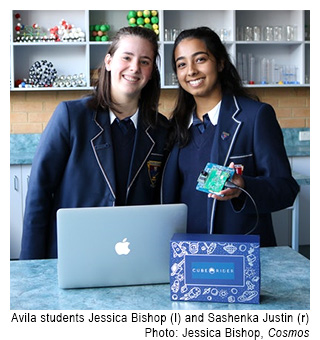Home >
News and Events >
2017 >
The sky’s the limit
/
30 November 2017
Students from a number of Catholic secondary schools have begun analysing the results of experiments they designed, coded, tested and refined that have returned from the International Space Station.
Through the cuberider program, students’ experiments were coded into a Raspberry Pi computer that was taken to the International Space Station via a Space X Falcon rocket launched from the Kennedy Space Centre at Cape Canaveral, USA.
From Sacred Heart College, Geelong, Emma Badrock, Annabelle Sargeant, Isabella Maier, Hannah Tribe and Phoebe Markovic learnt about the International Space Station through the year and what life is like for astronauts who live and work there.
‘They developed a range of experiments designed to capture information about the acceleration of the ISS, how much UV radiation the ISS is exposed to, how the magnetic field of the earth varies in different parts of the world,’ said Science teacher Bridget Dunstan.
Their experiments were run by astronauts and the results beamed back to earth. The data from the six experiments sent to the International Space Station will be analysed by the 2018 Year 8 group so they can further develop the experimental ideas.
From Avila College, Mount Waverley, Year 11 students Jessica Bishop and Sashenka Justin led their team’s experiments and were assisted by three Year 9 students, Beatrice Van Rest, Amarasi Wasalatilake and Michaela Williams.
‘We wanted to investigate the acceleration and rotation of the ISS, so we programmed the actual device ourselves from the beginning,’ said Jessica.
‘It had a bunch of different sensors on it, like a UVA sensor, an infrared sensor and even a camera,’ said Sashenka.
‘We chose to use the gyroscope and the accelerometer. We really wanted to investigate the orbits of the ISS, because orbits are a bit of a mythical thing that none of us understand. We found out that the ISS is actually in a constant state of falling around the Earth, and it’s the gravity and inertia that’s keeping it that way.’
Though the data retrieval took longer than expected, due to hurricanes in Florida delaying communications between the International Space Station and NASA, the students are now all systems go.
Read more about Avila’s students’ experience in the Cosmos article by Amy Middleton.